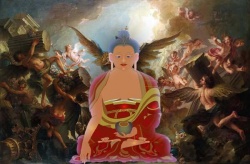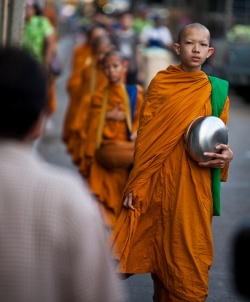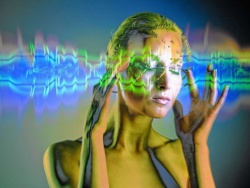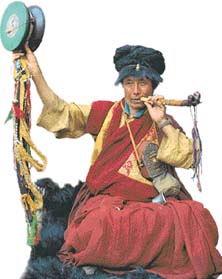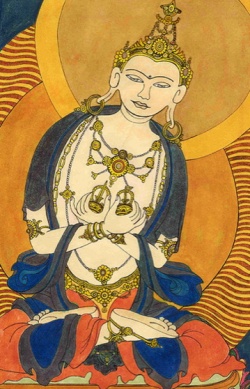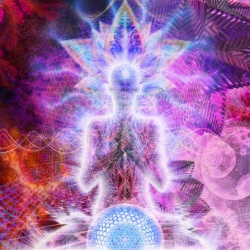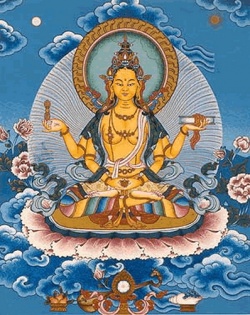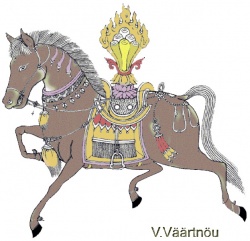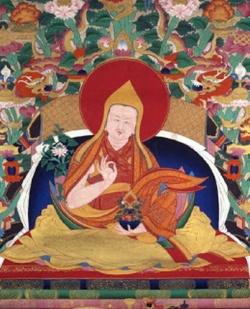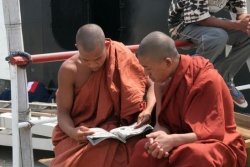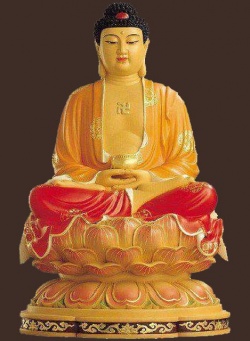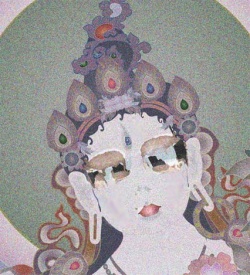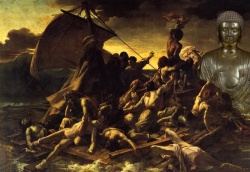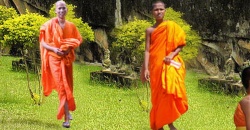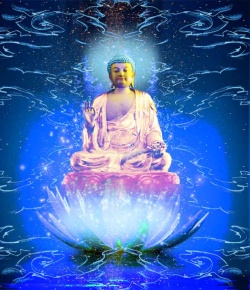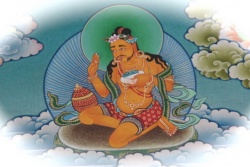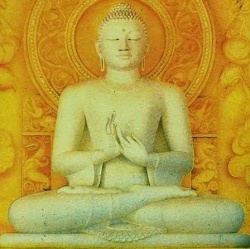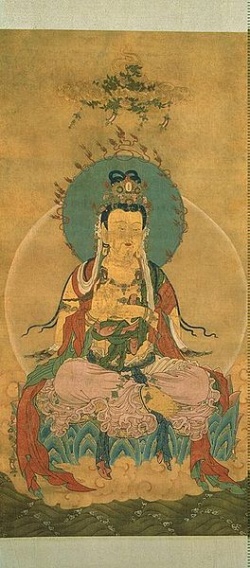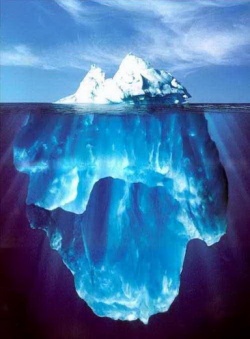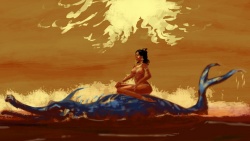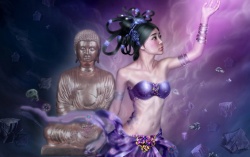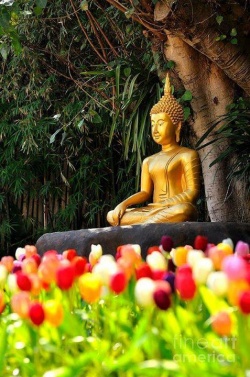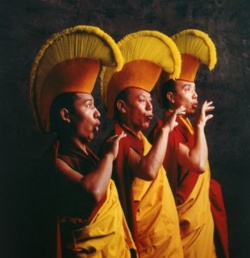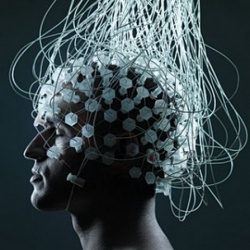Buddhist Demons & Protectors
"Generally there are two types of Guardians. Guardians may be worldly in nature ('jig rten pa'i srung ma), these being lesser deities or spirits converted to the Dharma by Buddha or some other great master. They are sentient beings like ourselves still caught up in Samsara. Although they may be very powerful and knowledgeable in certain respects, they are neither omnipotent nor omniscient. Their powers and their knowledge do have their limits.
Whenever the lama or practitioner evokes such tutelaries while performing a Rite of the Guardians, he or she must be careful to assume in meditation an appropriate divine form or powerful manifestation and to have offerings, whether actual or visualized in the mind, prepared before hand to present to the deities and spirits summoned. A Guardian or Sungma has been oath bound (dam can) previously to protect the Teaching and its practitioners, but in the retinues of each Sungma there are many Dregpa, that is, violent arrogant spirits, who easily become offended and angered when treated improperly.
Therefore, these retainers, in particular, must be propitiated, even bribed, with offerings (mchod pa Skt: puja) and thereafter, having accepted these offerings and being delighted and satisfied with them, they are again charged ('chol ba) by the practitioner to perform the protective tasks originally promised. Praises and devotion alone are not sufficient. These Guardians and their spirit retainers are not enlightened beings and so they must be cajoled and coerced to keep their promises, even at times threatened. Here there is an exchange of energy between the practitioner adn the Otherworld of the spirits-- a giving of gifts and offerings on the part of the practitioner and subsequently a performing of actions and tasks on the part of the Guardians. This is reflected in the words of the liturgy of a Rite of the Guardians.
The other kind of Guardian is transmundane or beyond the the World ('jig rten las 'das pa'i srung ma). Such a Guardian is not some lesser god or spirit subdued and converted to the Dharma and bound to service by fierce oaths, but a manifestation of apparition (sprul pa) of an enlightened being. Such a being does not need to be bribed with offerings in order to behave itself and benefit humanity because, from the very beginning, it is an active manifestation of enlightened compassion.
All of the Buddhas and great Bodhisattvas possess the capacity to project and emanate these Guardians that have a spiritual nature. Yet, in relating to such a manifestation of enlightened awareness, the practitioner makes offerings in the same way as with the worldly Guardians. But this practice is for one's own benefit in terms of one's spiritual development. The Buddha or an enlightened Guardian has no need for our offerings. Moreover, generosity (sbyin pa) is the first smong the Ten perfections (phar phyin bcu) and there is no better way to generate meritorious Karma for oneself than by giving to others generosity."
-Intro by Vajranatha (from: The Healing Practice for Sidpa Gyalmo: Vidyadhara Publications: 1996)
Here is a listing of some principle protectors and demons. Primary source of info is:
"Oracles and Demons of Tibet" with supplements and additional notes..
Compiled by EN - Versio 6/8/01
"Rather than giving offering cakes to these protectors,
a thrust of the point of a meteorite iron razor is more profound.
The behaviour of ghosts and harmers is weird".
-Jigs med Ling pa-
TIBETAN CLASSIFICATION OF THE 18 DREGS PA
1.lha [skt:deva) - gods/spirits, all male, mostly good disposition
2.lha ma yin [skt: asura) demi god(s) lHa min dbang po thags bzang is king of asuras.. He is black and rides a chariot
3.bdud [skt:mara) Bdud are extremely wicked and always evil and hostile to humans. Some cause coma or fits of unconsciousness while others cause illness (against which the rite of brgya gzhi must be employed) They are represented as black male demons those who oppose religion. They are supposedly appeased by pig sacrifice/offering and are offered black gtor ma. They have various implements which are used by other demons and protectors:
(a) the black magic notched stick of bdud,
(b) .black horse of bdud with white heels,
(c) black snare of bdud.
There are considered to be 360 bdud who reside in the castle of 9 pinnacles.See also the myth of bdud rtsi (on main webpage)
4.dmu - These are celestial brown demons. They ride horses, and some are mixed with the bdud: dmu bdud). The progenitor of rdo rje legs pa was a white dmu bdud.
5.btsan They are red male demons living in mountains often warrior like, sometimes wearing red silk ral kha, and a leather helms or Holding bow and arrow and riding on red horses.They are offered red gtor ma. Tsi 'u dmar po is considered the most important btsan.
6.[[bdud btsan evil btsan)
7.'tshams bon sky deities)
8.gnyan -a type of sa bdag - (yellow) - some say (green) ancient tibetan evil demons- earth inhabitors also in trees, forests and meadows (sort of earth elementals or gnomes.)
9.klu skt:naga Klu or nagas are represented as serpentss and are considered water elementals, mostly green color. Nanda (ananta) and Takshaka - are chiefs of nagas, and they are ruled by the western king.There are too many types of klu to list here. Klu are propitiated in all kinds of weather controlling operations (rain etc) and they can cause various illness' to humans like leprosy, ulcers and sores. They guard gter ma treasures buried in the ground, along with precious gems. They are often used in rights of black magic to cause sickness in a targeted victim. The Garuda is used against them, along with the Nakula (mongoose).
10.sa bdag po sab dak local earth demons, earth owners. The most malignant are the gnyan who infest trees and rocks (see number 8 above) which must be worshiped and not touched. All earth demons are under mother nature "khonma" who rides a ram and is dressed
in yellow/gold with golden noose and with attendant sa-thel ngag po. Ceremony "sa go" is for closing earth portals with Ram skull, used when building a house etc.
11.rgyalpo skt:raja mostly hostile and ego serving disembodied intellectual spirits of important, outstanding personalities: lamas, leaders, or kings who did not reach nirvana - There is an expression in Tibetan "rgyal po khros pa" wrath of a gyalpo demon. The Dalai Lama has attempted to stop the propitiation of one of the most violent rgyalpo demons in the Buddhist Pantheon: the spirit of a murdered monk who swore vengence against the other schools of Buddhism (particularly Nyingma). Some Gelugpas still propitiate him today, and the horror story of this rgyalpo's reign of terror are well documented. The leader of the Gyalpo however, is often considered to be Pehar "rgyal po chen po" and he is also known to have caused havoc in tibet.
12.blon po- ego serving disembodied ministerial spirits
13.tshong dpon unknown The name means "Merchants", but no description is available at this time)
14.gshin rje "big ghosts", same as gshin hdre - life taking demon ? or yama?
15.[srinpo]] / srinmo [skt: rakshasas / rakshasis) - male and female cannibal demon/spirits equated with indian rakshas
16.bgegs [skt: vighna obstacle creating demons. They try to disrupt many things such as religious rites. Their king is called " byi na ya ga" and is depicted as black, wearing black silk garments, holding a kapala and riding a black horse. bgegs are offered white/red gtor ma.
17.the'u rang- There are considered to be at least 9, 11, or 360 of them.They inhabit caves and earth abodes, they are known to impregnate women. Namkhai Norbu's family is said to have originated from a the'u rang fathering. They are held responsible for causing hail and lightening.
The king of the the' u rang is " Debrong Pano" who has 9 heads, 18 arms, and 1000 eyes. He is traditionally appeased by bonpos against
foul weather.
18.dri za [skt: gandharva) , celestial musicians, a type of spirit - deity, they are ruled by the eastern king
OTHER SRUNG MA AND DREGS PA
19. dge bsnyen [skt:upasaka lower end dharmapalas that cause illness
20. ma mo [skt: matrika) Mamos or Matrikas are female, black in color and equated with, maksor rgyalma "maharani" disease producing form of 'durga' , also, Ekajati is queen of mamos tho' she herself is considered a lha-mo or devi. The mamos haunt wild and desolate places, and when aroused can cause strife and warfare among humans.. They are attracted to the carnage of the battlefield.
21. 'gong po / gong po- There are men women and children 'gong po (gong po) . They appear in groups of 7 or 9.The males having iron noses, and females having turquoise eyebrows. They are supposedly hostile to the rulers of Tibet and the " 'gong po spun bdun" must be appeased each year by the Dalai lama. A special mdos is offered to this group. It is said that Padmasambhava subjugated 'gong po he found in a ravine, but also that King Glang darma was possessed by one of them. Yam shud dmar po is their leader.
Do not confuse with mgong po!
22. mgon po [skt:mahakala Mahakalas are usually bound protectors of the buddha dharma. There are either 72 or 75 of them. A mahakala has four principle figures in their retinue: Jinamitra, Takkiraja, Tra ksad (lord of bdud), ksetrapala (a yaksha). Many of the gonpo wear black silk garments (folded thrice or four times). Some bear the esoteric sign of the mug pa'i g.yung drung, or swastika of obscurity") Their black garments are usually bound up in a golden girdle. They carry in their multiple hands various instruments: Trishula, Karti, Kapala, club, snake/snare, etc and are depicted in different colors, but usually wear a skull mala , tiger skin, bone ornamentation, including a crown of skulls. [Vide: Nebesky chapter on these deities) Do not confuse with 'gong po !
23.gdon [little known] some type of evil spirit, general "evil". There is four common gdon, and 15 great gdon, and again 18 greater gdon.
They are said to injure children. According to tradition there are 424 total gdon.
24. mtshun, tshun, btsun, mes btsun These are ancestral (male/female) spirits in the train of the mountain god. They are known to be maleficent.
25. bse (se) bsve [little known] bse bdud (evil) bse btsan (powerful)
26.sha za nag po - black flesh eating lion headed demon in the train of Mahakala
27.rig 'dzin [skt: vidyadhara)- perhaps spirits of or from magicians in the wilds. Seem to be some kind of tulpas or magical projections from yogis.
28.'byung po [skt: bhuta) elementals associated mostly with retinue of shiva. One offers a small dough pyramid gtor embellished with a dough skull on top.
29.brog mo (goddess') pasture dwelling female entities
30.klu brog mo [skt: nagini) a type of female nagas. klu btsan (powerful nagas)
31. yi dvags [skt:preta, hungry ghosts
32. rgyal 'gong -mix of rgyal po and gong po
33.lcam sring (beg tse) (brother-sister) (hidden mail) He is a Dharmapala Born of a Yaksha and a Rakshasi. He is often called "mahayaksha" or commander of mamos, bstan, yakshas, gshin rje, bdud and raksas. He wears copper mail and a turban. He sometimes rides a horse of a btsan, but common tradition relates him to an owl. The call of which is generally unlucky, unless you are connected in a positive way with this deity.
34.'gying (ging) Old bonpo class of male and female (ging po / mo) entities who carry swords.Sometimes they are divided into 8, 12, or 18 classes. Often the name is used abstractly in the buddhist texts to refer to hero and heroine deities.
35.rygu skar - naksaktra The female entities of the 28 lunar mansions. Padmasambhava subdued them on mount Kailash.
36.'dre ngan: dre (evil) ngan (demon) very hostile to humans along with the bdud. There are alot of prescriptions against protecting
human beings from " dre"
37. sman mo (sman bstun)menmo, or maiden spirits- Four Menmo sisters, guardians of Lake Kokonor or Menmo sisters, four naginis inhabiting Lake Kokonor or the tradition of: sman mo mched bdun - Seven Menmo Sisters
38.dam sri nine sibling spirits who have violated their commitments. These are malevolent samaya-breaking "perverters, transgressors, and violators". They are flesh eating vampire demons who have animal heads. Believed to be born of eggs and to live in the mountains. They cause all kinds of problems, and often capture children. There appear to be more than 9. Some are: pho, mo, chung, dur, btsan, dgra, rnal 'byor pa,
med, klu, gri, god, lha, sdang ba, rgyal po phung ba, blon po phung ba, yul khams phung ba, dme yis phung ba. The main practice used against
sri demons is rdo rje gro lod.
39.ro lang [skt: vetala vampire demons who haunt cremation grounds
40.gnad spyan - disease givers, red in color
41.'khrung lha "birth gods" "gzhi bdag, sa bdag, btsan"
42.dgra lha (dab la) (enemy god) the warrior/protective spirit sitting on a person's right shoulder
Serving retinue of Gesar they are considered a war-god, or deities of war who helps one overcome enemies.
dgra lha - Warrior spirit. Dralha. dgra lha'i rgyal po pe kar - King Pekar of the Warrior-spirits
43.srong lha "life god" sitting in left armpit, gives "wealth" presides over heart/life.
44.po lha - male ancestral god (resident under armpits), represents life
45.mo lha- mother goddess, person deity representing- stregnth
46.yul lha country god, resident on crown of head, represents dominion. The leader of the Yul lha is a mountain god named
" lha rabs shams po "
47.sa gzhi, mi rigi lha (earth gods) worshippped in spring
48.smra zhang, chunggi lha (ancestral gods) worshipped in summer
49.stod sum pau lha, three upper gods, worshipped in autumn
50. gshed - demons who cause sicknesses... (just short of death)
gshed of east)] is woman with heads of tiger/vulture riding red ass
gshed of south is man with with heads of horse/snake riding on a red horse
gshed of west has heads of bird/monkey, rides on grey goat
gshed of north has heads of rat/pig and rides blue pig
gshed of southeast is dragon headed woman riding mdso yak
gshed of southwest is sheep headed woman riding bull
gshed of northwest is dog headed woman riding a pig
gshed of northeast is bull headed woman riding buffalo
51. gson hdre- demon eater of live animals
52. gnod sbyin / gnod sbyin mo [skt:yakshas / yakshini ] a class of beings of the deva realm, powerful guardian spirits, can both help and harm, they are one of the eight kind of gods and spirits (lha srin sde brgyad). They are semidivine beings, generally benevolent but sometimes wicked. Many are powerful local nature divinities, others live on Mount Sumeru, guarding the realm of the gods.
They are represented as ten guardians of the directions and gnod sbyin pho mo nyi shu rtsa gcig - Twenty-one Male and Female Yakshas. kang wa bzang po - "well filled one" is said to be king of yakshas. Famous yakshas are: Dhana, Kala, Kubera (Nor lha), Vaishravana, and Jambhala.
53. khen pa - grandfather of 3 worlds rules the local sky/wind spirits. He has snow white hair, in white riding white dog of sky carrying crystal wand. Nam-go is ceremony for "closing the portals of the sky" using dog skull.
54.hanubhati ? (flesh eating)
55. bsTan ma (bstan ma bcu gnyis) The 12 tenma sisters, or -female mountian spirit protectors; local female spirit of the Himalayan region.
They were subjugated to service the Dharma by Padmakara. They are associated with the months of the year the realms and the nidanas.
They are propitiated in protector practices like Vajrakila, and with black,white, red torma (round, triangular, square).
56. [[gzhi bdag Zhi dak - Local demons. Each village has zhi-dak which can be: black bdud, red tsan, or klu.
Zhi dag can be any class of demon actually, but they are a class of beings who's karma did not even get them a hell rebirth.
zhi dak of temples/monasteries are always red tsen (bstan) which are spirits of deceased novices or ill natured lamas
When traveller reaches summit of hill/pass offer rag torn from clothes tied to a stick, plant it on a cairn (lapche) and say
"ki ki ki ki" "gsol gsol gsol gsol", "lha gyal-o" "lha gyal-o" to appease the Zhi dak. They are offered round white gtor ma.
57.EKAJATI orMa Ekajati - is considered a lha mo. or devi. She is one of the main protectors of the Dharma in the company of Rahula and Dorje Legpa.
She is found in the retinue of:
mgon lcam dra
mgon dmar rkang gling can
mgon po bzhi sbrags
Form 1
Rin 'byung says she comes forth from rakta'i rgya mtsho (sea of blood)
which is surrounded by dark red mountains
She is on ravi/padma
rt hand = trisula
lft hand = pasha with hrd
human skin as upper garment
she is in a blazing firecloud
female wolves are her messengers
Form 2
sngags srung "guardian of mantras"
odka' srung chen mo rdo rje khro gdong ma
darkbrown with trisula and kapala
stands on ravichandrapadma and vighnas and enemies
Form 3
Ralcigma
she stands on a brown flaming triangle.
Hair up in one tuft
emaciated breast and one foot
she is dgra lha'i rgyal mo
Form 4
eye gazes into all worlds
tooth destroys enemies
she is dark blue and has a lock of turquoise
right hand holds fresh torn out enemy heart
left hand dispatches a hawk of turquoise
two feet stand on pedestal of earth
sku'i sprul pa are 100,000 nepalese (balmo) women
gsung gi sprul pa are dakinis
thugs kyi sprul pa are mon mo nagmo black mon women
On right side the great ging, black lha chen dpal 'bar ma ning like a rakshasa
3 eyed with diadem of skulls, snakes, banner heart and snare
body tulpa is: mgon po stag zjpm )pm toger_
speech tulpa is red: mgon po beng
mind tulpa is: [[mgon po [gri gug]] can with chopper
karma tulpa is mgon po tra ksad
On left side the great sgrol ging "rdo rje legs pa" or skyes mchog vajra tigle rtsal
fire body, in white silks and tiger skin
thunderbolt and heart, adn he mounts a white lion
he has retinue of 360 bros adn hords of the'u rang demons and monpas
las mkhan ma "Maidservant" is in retinue of Ekajati
mamo gnod sbyin mdzes ldan ma "guardian of secret mantra gsang sngags bka' yi srung ma
and riches dkor srung, she holds hook and mirror
58.RAHULA or Za Rahula, is considered a gza, or planetary deity. He is one of the main protectors of the Dharma in the company of Ekajati and Dorje Legpa. He is one of the most feared "palas" or protectors because of his ability to send his victims into epileptic and apoplexic fits, deliver shocks, and cause electrical (nerve) disorders in the human body.
He rules over Lightening, Electricity, Epilepsy, Bank (Wire Transfers), and also the Internet.
He is the great king of planetary gods: gza' mchog rgyal po (mahakalaraja?)
Other names:
[[chos skyong]gza' bdud chen po]]
gza' rgod dug gi spu gri
drang srong gza' bdud sgra can 'dzin
khyab 'jug sgra gcan 'dzin
khyab 'jug gnam mtsho'i bdag po
srin po'i rgyal po gza' bdud rahula
du ba 'jug ring
rogs ste nag po
gza'chen gza'phran (greater and lesser planet devatas)
In retinue of dpal ldan dmag zor remati
Form 1
drang srong chen po gza' bdud rahula:
9 heads with raven head on top, body covered with 1000 eyes
lower body is serpent. Bearing teeth, illness spills from mouth
right hand makara banner, left has bow and arrow to shoot into heart of samaya breakers
he dispatches klu bdud (naga serpent demons) as messengers
Form 2
in the Vaidurya karpo he is among 5 planetary devas known as "khol sa bdag lnga" 5 earth lord serfs, and
gnam gyi gza' chen lha rgod "great sky planet god"
In another form he is in between sky and earth as: bar gyi khyab 'jug rahu'i rtsis
His shakti resides in earth "sa yi 'phung bye nag mo", who is ugly black woman with sickle in rt hand
and sack of disease in left hand.
The main face of rahula is gza' bdud and the other 8 are lha srin sde brgyad
His raven head guards dharmashastra, while the other eyes watch worlds..
If the ravens head shadow falls on someone they get apoplexia fit
3 lowest heads are green with gshin rje 9 angry eyes looking down
middle faces have blue red faces of the bdud and 9 blood shot eyes look into space between earth/sky
3 upper faces are of lha type; green red white with nine peaceful eyes skyward
59. rDo rje Legs Pa - [skt: Vajrasadhu) A main protector of the dharma in the company of Ekajati and Rahula. Damchen Dorje Legpa
was originally the Bonpo deity "A-bswe chen po", who's cult is still existant among bonpos altho he was forced into service to the dharma by Padmasambhava in the 8th century CE.
60. srid pa rGyal mo - "Worldly Queen", a protector "bon skyong" of Yungdrung Bon teachings, and one of the demon goddess' known as the race of female demons, or "Dregs pa mo rgyud." She is also called gNam phyi gung rgyal, the grandmother of heaven, queen of the sky. She is associated with the power of herbs, and healing powers brought down from the sky. She became one of the main protectors of the Drikung Kagyud in her form of "A-phyi" or "Achi Chokyi Drolma". In her form of riding a black or red mule, she is very similar (and to be equated with) Palden Lhamo.
61. phra men / phra men mo - [skt: Pishaci] - Female animal headed cannibal demons found in the retinues of wrathful deities
62. gzah - planetary demons such as rahula and etc.
63.dbal - a class of bon skyong (protectress' of bon) They are in groups of 9, having coming forth from 9 eggs. The 9 wrathful animal headed females are known as "those who run swiftly" and they have the heads of: dragon, snake, jackdaw, lion, brown bear, wolf, tiger, khyung, and makara. They are invoked to harm or destroy enemies of the bon religion.
64. me lha - [skt: agni deva ] ancient bonpo fire deities (male /female) who became equated with Buddhist Agni. Lama Yeshe noted in his Dakini practice that the fire circle of the mandala will keep out most "demons" but not the me lha. In order to protect the sanctity of the mandala practice from their transgressing the fire one should visualize sharp weapons revolving around the mandala circle through the fires.
65.
INDIAN CLASSIFICATION OF DEMONS/SPIRITS
The Jainas classify 'otherwordlies" into 3 catagories. For convenience sake I will use 2 of the catagories here.
BHAUMEYIKAS
1. Naga/Nagini - This class of Serpent beings dwell in water sources, and guard treasures. One famous Naga king is "Cakavaka". Nagas are believed to dwell in the western quarters of the world, and are ruled by the Nagarajas: Virupaksha and the Vedic 'Varuna", lord of waters, himself called a "prdaku", or adder.
2.Asura - Traditional rivals of the Vedic gods, these "demigods" or "anti-heros" try to disempower the rites and actions of the Vedic dharma. It is not certain if they represent non-aryan tribes or non-aryan gods, however they represent a breakdown or threat to the traditional Vedic Dharma. One of the most famous Asuras was the serpent "Vrtra", who is slain by Indra.
3.Suvarna
4.Vidyut
5.Agni Beings
6.Dvipa Beings
7.Udadhi
8.Vata
9.Ghanika (Kumara)
VYANTARAS
10.Yaksa/Yaksi- A general term meaning "beings". Used sometimes for gods like Indra "great yaksha" or even for Buddha. However, in general folk usage, these "beings" are ambiguous shape-shifting primaeval nature beings who protect and guard "wealth" and "portals" (dvarapalas), and bestow fecundity. They are essentially tribal, untamed, uncivilized and outside the bounds of societies.They can have magical powers, and assume the form of demonic or beautiful beings with red eyes, and bulging bellies. Some survive on human flesh, others desire to copulate with human beings (particularly the females). They dwell in the wild secret recesses of nature: forests, caves, and water sources and accept yajna "sacrificial offering" from humans. Sometimes they can assist humans in time of crisis, however they are said to be able to gain control over humans if one is to touch the earth in their location, or fall under the shade of their tree.
The King of the Yaksas is called "Kubera / Kuvera Yaksa or Vaishravana" who is the guardian of the North and the Yaksa paradise called "Alaka". The King and Guardian of the South is Virudhaka Yaksa, of the East is Gamgita Yaksa, Lord of Gandharvas. The names of some famous Yaksas/Yaksinis: Cetiya, Chandra, Cittaraja, Kalaveva, Kaluvela, Bhola, Moggarapani, Supavasa, Suciloma "needle haired one", Ajakalaka, Sudasana, Canda, Batanmara, Alavaka, Mahakoka, Culokoka, Sirima, Macakruka, sulocana "beautiful one", Harikesa
11. Pisaca/ Pisaci
12.Bhuta/Bhutini
13.Raksha/Rakshasi - Flesh and blood eating demons, devoid of dharma. Sukesin is the name of one famous one.
Brahma Rakshasas are subclass which is define by ritual uncleanliness and non-attention to the dharma.
14.Kinnara
15.Kimpurusa
16.Mahoragas
17.Gandharvas - celestial musicians who are attracted by "scents" ie Incense, and females. They are associated with music lovers and the sexually promiscuous.
OTHER INDIAN DEMONS:
18.Apsara - celestial nymph(s), they can act like sirens, luring men into their layers and stealing their life force.
19.Gana
20.Kumbhanda - A type of demon with pitcher-like testicles, ruled by Virudhaka Yaksa, the king and guardian of the Southern quarter of the world.
21.Matrika - They are a type of devi, usually numbering in 7 or 8 and are considered to be the consorts and shaktis of devas
22.Dayamulu
23 Preta/preti - hungry ghosts, or wandering spirits of disembodied humans who have died with strong unfulfilled desires.
24.Graha -"grasper" any type of demon which tries to control or possess or afflict human beings.
25.Dhanvantari - physician to the devas
26.Makara - a crocodile type creature with a fish tail or bushy tail. Sometimes depicted with an elephant snout.
27.Manasa- devi (goddess) of snakes - similar to Medusa
28.Guhyaka
29.Daitya
30.Marut
31.Rudra
32.Vasu(s)
